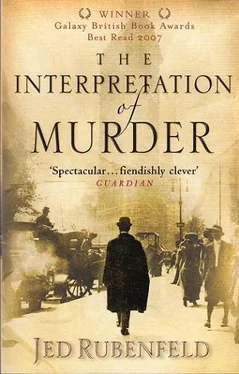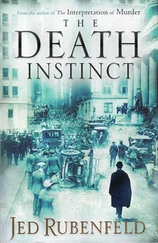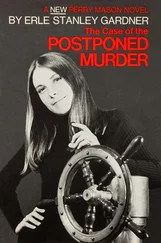Jed Rubenfeld - The Interpretation of Murder
Здесь есть возможность читать онлайн «Jed Rubenfeld - The Interpretation of Murder» весь текст электронной книги совершенно бесплатно (целиком полную версию без сокращений). В некоторых случаях можно слушать аудио, скачать через торрент в формате fb2 и присутствует краткое содержание. Жанр: Исторические приключения, на английском языке. Описание произведения, (предисловие) а так же отзывы посетителей доступны на портале библиотеки ЛибКат.
- Название:The Interpretation of Murder
- Автор:
- Жанр:
- Год:неизвестен
- ISBN:нет данных
- Рейтинг книги:5 / 5. Голосов: 1
-
Избранное:Добавить в избранное
- Отзывы:
-
Ваша оценка:
- 100
- 1
- 2
- 3
- 4
- 5
The Interpretation of Murder: краткое содержание, описание и аннотация
Предлагаем к чтению аннотацию, описание, краткое содержание или предисловие (зависит от того, что написал сам автор книги «The Interpretation of Murder»). Если вы не нашли необходимую информацию о книге — напишите в комментариях, мы постараемся отыскать её.
The Interpretation of Murder — читать онлайн бесплатно полную книгу (весь текст) целиком
Ниже представлен текст книги, разбитый по страницам. Система сохранения места последней прочитанной страницы, позволяет с удобством читать онлайн бесплатно книгу «The Interpretation of Murder», без необходимости каждый раз заново искать на чём Вы остановились. Поставьте закладку, и сможете в любой момент перейти на страницу, на которой закончили чтение.
Интервал:
Закладка:
'She certainly is,' agreed the mayor.
'Raped?'
'No thank heavens.'
'Thank heavens.'
I found the others in the halls of Roman and Greek antiquity at the Metropolitan Museum. While Freud was engrossed in conversation with the guide — Freud's knowledge was quite astounding — I fell behind with Brill. He was feeling better about his manuscript. His publisher, Jelliffe, had at first been as mystified as we had been, but then recalled that he lent his press the previous week to a church minister, who was publishing a series of edifying biblical pamphlets. Somehow the two jobs must have been merged together.
'Did you know,' I asked Brill, 'that Goethe was Jung's great-grandfather?'
'Rot,' said Brill, who had lived in Zurich for a year, working under Jung. 'Self-glorifying family legends. Did he get to von Humboldt too?'
'Yes, actually,' I replied.
'You would think it would be enough for a man to marry into a fortune without having to invent a lineage for himself.'
'Unless that's why he invents it,' I said.
Brill grunted noncommittally. Then, with a strange lightness, he pulled back a forelock of his hair, revealing a wicked scrape on his brow. 'You see that? Rose did that last night, after you had all left. She threw a fying pan at me.'
'Good Lord,' I said. 'Why?'
'Because of Jung.' 'What?'
'I told Rose about the remarks I made to Freud concerning Jung,' said Brill. 'It sent her into a rage. She told me I was jealous of Jung, that Freud values him, and that I was a fool because Freud would see through my envy and think worse of me for it. To which I replied that I had good reason to be jealous of Jung, given the way she was looking at him all night. In retrospect that may have been a false note, since it was Jung who was looking at her. Do you know she has the same medical training I do? But she can't get a job as a doctor, and I can't support her, with my four patients.'
'She threw a frying pan at you?' I asked.
'Oh, don't give me that diagnostic look. Women throw things. All of them, sooner or later. You'll learn. All except Emma, Jung's wife. Emma merely hands Carl a fortune, mothers his children, and smiles when he cheats on her. Serves his mistresses dinner when he brings them into the house. The man is a sorcerer. No, if I hear another word about Goethe and von Humboldt, I just may kill him.'
Before we left the museum, there was nearly a crisis. Freud suddenly required a urinal, just as he had at Coney Island, and the guide sent us to the basement. On the way downstairs, Freud remarked, 'Don't tell me. I will have to go through endless miles of corridor, and at the end there will be a marble palace.' He was right on both counts. We only reached the palace in the nick of time.
Coroner Hugel did not get back to his office until Tuesday evening. He had spent the afternoon at the Acton house on Gramercy Park. He knew what he would write in his report: that physical evidence — hairs, silk threads, shreds of rope — now proved beyond doubt that the same man who killed Elizabeth Riverford attacked Nora Acton. But the coroner cursed himself for what he had not found. He had scoured the master bedroom. He had pored over the rear garden. He had even crawled through it on hands and knees. As he knew he would, he found broken branches, trampled flowers, and plenty of other signs of flight, but nowhere the proof he sought, the one piece of hard evidence with which he could expose the perpetrator's identity.
He was exhausted when he reached his office. Despite the mayor's command, Hugel hadn't circulated to his staff the offer of a reward to anyone who found the Riverford girl's body. But he could hardly be blamed for that, Hugel told himself. It had been the mayor who ordered him to go directly to the Actons' house rather than back to the morgue.
In the hall, he found Detective Littlemore waiting. Littlemore reported that one of the barracks boys, Gitlow, was on a train to Chicago. He would be there by tomorrow night. In his usual chipper spirits, Littlemore also recounted the strange episode of Mr Banwell and the horse. Hugel listened intently and then exclaimed, 'Banwell! He must have seen the Acton girl outside the hotel. That's what scared him!'
'Miss Acton's not exactly what I'd call scary, Mr Hugel,' said Littlemore.
'You fool' was the coroner's response. 'Of course — he thought she was dead!'
'Why would he think she was dead?'
'Use your head, Detective.'
'If Banwell's the guy, Mr Hugel, he knows she's alive.'
'What?'
'You're saying Banwell's the guy, right? But whoever attacked Miss Acton knows she's alive. So if Banwell's the guy, he doesn't think she's dead.'
'What? Nonsense. He might have thought he had finished her. Or — or he may have been afraid she would recognize him. Either way, he would have panicked when he saw her.'
'Why do you think he's the guy?'
'Littlemore, he is over six foot tall. He is middle-aged. He is rich. His hair was dark but now is graying. He is right-handed. He lived in the same building as the first victim, and he panicked at the sight of the second.'
'How do you know that?'
'From you. You said his driver told you he took fright. What other explanation is there?'
'No, I meant how do you know he's right-handed?'
'Because I met him yesterday, Detective, and I make use of my eyes.'
'Gee, you're something, Mr Hugel. What am I, right- handed or left-handed?' The detective put his hands behind his back.
'Will you stop it, Littlemore!'
'I don't know, Mr Hugel. You should have seen him after it was all over. He was cool as a cucumber, giving orders, cleaning everything up.'
'Nonsense. A good actor, in addition to a murderer. We have our man, Detective.'
'We don't exactly have him.'
'You're right,' mused the coroner. 'I still have no hard evidence. We need something more."
Chapter Ten
Leaving the Metropolitan, we took a carriage across the park to Columbia University's new campus, with its stupendous library. I had not been there since 1897, when I was fifteen and my mother dragged us to the dedication of the Schermerhorn building. Brill, fortunately, did not know of my marginal connection to that clan, or he doubtless would have mentioned it to Freud.
We visited the psychiatric clinic, where Brill had an office. Afterward, Freud announced that he wished to hear about my session with Miss Acton. So, while Brill and Ferenczi remained behind, discussing therapeutic technique, Freud and I took a stroll on Riverside Drive, whose broad promenade afforded a fine lookout on the Palisades, the wild and broken New Jersey cliffs across the Hudson River.
I left out nothing, describing to Freud both my first session with Miss Acton, ending in failure, and the second, ending in her revelations concerning her father's friend, Mr Banwell. He questioned me closely, wanting every detail, no matter how seemingly irrelevant, and insisting that I mustn't paraphrase but relay her exact words. At the close, Freud stubbed out his cigar on the sidewalk and asked whether I thought the episode on the rooftop three years ago was the cause of Miss Acton's loss of voice at the time.
'It would seem so,' I answered. 'There was involvement of the mouth and an injunction not to tell. Something unspeakable had been done to her; therefore she made herself unable to speak.'
'Good. So the fourteen-year-old's shameful kiss on the roof made her hysterical?' said Freud, measuring my reaction.
I understood: he meant the opposite of what he was saying. The episode on the roof, as Freud saw things, could not be the cause of Miss Acton's hysteria. That episode was not from her childhood, nor was it Oedipal. Only childhood traumas lead to neurosis, although a later event is typically the trigger that awakens the memory of the long- repressed conflict, producing hysterical symptoms. 'Dr Freud,' I asked, 'isn't it possible in this one case that an adolescent trauma caused hysteria?'
Читать дальшеИнтервал:
Закладка:
Похожие книги на «The Interpretation of Murder»
Представляем Вашему вниманию похожие книги на «The Interpretation of Murder» списком для выбора. Мы отобрали схожую по названию и смыслу литературу в надежде предоставить читателям больше вариантов отыскать новые, интересные, ещё непрочитанные произведения.
Обсуждение, отзывы о книге «The Interpretation of Murder» и просто собственные мнения читателей. Оставьте ваши комментарии, напишите, что Вы думаете о произведении, его смысле или главных героях. Укажите что конкретно понравилось, а что нет, и почему Вы так считаете.












